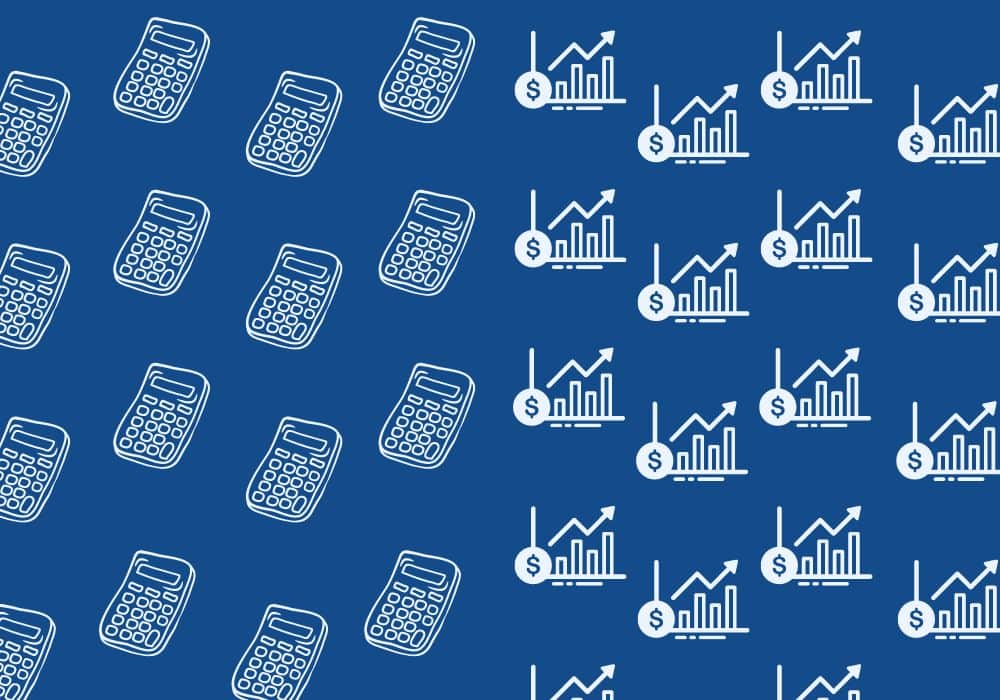You know you want a job that deals with money and numbers. If you get a job in finance or accounting, you’ll be doing just that. But how do you choose? What’s the difference between finance vs. accounting?
While both career paths involve money, the main difference is how each type of professional manages that money. Accounting professionals focus on recording, summarizing, and classifying financial information, while finance professionals focus on using that financial information to make decisions.
So, finance vs. accounting — which one is right for you? In this guide, we’ll discuss the critical differences between these career paths, then give you a free quiz to help you decide which path best suits your career goals, skills, personality, and interests.
What Is Finance?
Finance is a career path concerned with helping people, businesses, and even governments make smart decisions with their money. Finance professionals analyze financial information to help clients maximize their wealth, save money, or invest for their future.
Types of finance are typically differentiated by who you work for:
- Public finance: Working for the government to help make decisions about revenue, expenditures, budget, spending, taxes, and fiscal policy
- Personal finance: Helping individuals manage their finances or meet their financial goals
- Corporate finance: Working with businesses to help them stay up and running
For example, a personal financial advisor meets with clients to understand their financial goals and may offer advice on where to invest some of their savings. An investment banker may also offer investment advice; they’ll work with a business, creating financial models to support their investment recommendations.

Citi Finance
Experience a day in the life working on Citi's finance team as you help manage business KPIs, identify financial risks, and predict credit card sales.
Avg. Time: 5-6 hours
Skills you’ll build: Fact-finding, data analysis, communication, presentation, commercial awareness
Finance Jobs
Finance is a broad sector that offers many different types of careers depending on who you’d like to work for. Popular careers in finance include:
- Asset manager
- Budget analyst
- Compliance officer
- Credit analyst
- Data analyst
- Financial adviser
- Financial analyst
- Investment adviser
- Investment banker
- Portfolio manager
- Quantitative analyst
- Risk analyst
- Venture capitalist

Investment Banking
Advise a hypothetical client on a suitable acquisition target to help expand their operations in Asia.
Avg. Time: 3-4 hours
Skills you’ll build: M&A screening, company analysis, strategic rationale, modeling, DCF, presentation
What Is Accounting?
Accounting is a type of finance that focuses on gathering and reporting financial information. These professionals work with their clients’ accounts to understand how much they earn and spend. They sometimes report that information to authorities — for example, tax accountants report information to the Internal Revenue Service (IRS).
Accounting careers differ on what type of financial information an accountant focuses on and what clients they’re working with:
- Financial accounting: helping businesses keep track of their financial information
- Managerial accounting: using financial information to help companies make financial decisions
- Tax accounting: making sure clients comply with tax processes and codes
- Forensic accounting: investigating finances for potential criminal activity
For example, a tax accountant will use financial information to work with you during tax season, ensuring that you’re filing your taxes correctly and reducing your taxes as much as possible. A forensic accountant will be more like a detective with financial information, combing through records to identify potential fraud or embezzlement.
Accounting Jobs
Accounting jobs cover a wide variety of industries and titles depending on what type of financial information you’d like to work with:
- Accounting clerk
- Actuary
- Auditor
- Bookkeeper
- Certified public accountant
- Claims adjuster
- Cost accountant
- Financial manager
- Forensic accountant
- Insurance underwriter
- Loan officer
- Payroll assistant
- Staff accountant

KPMG Career Catalyst Program: Audit
Learn how to do an external audit and communicate findings to a hypothetical client.
Avg. Time: 3-4 hours
Skills you’ll build: Audit deliverable, Excel, problem-solving, data visualization, analytical procedures
Key Differences Between Finance vs. Accounting
The main difference between finance vs. accounting is what these professionals do with financial information. Accounting professionals typically gather, organize, and report financial information. Finance professionals analyze and apply that information to inform business decisions.
“Basically, it’s about external and internal orientation,” says Eric Croak, CFP, accredited wealth management advisor, and the president of Croak Capital, a wealth management firm. “Those of us in finance tend to look more outward, while accounting is oriented inward. Finance evaluates things like vendor costs, credit options, investment possibilities, market conditions, and even what competitors are doing, to guide strategy and financial decisions that improve positioning in the face of external elements. Meanwhile, accounting’s role in organizing and reporting figures related to payables/receivables, payroll, inventory, etc., highlights internal data points. External factors might indirectly influence the accounting process, but they aren’t the primary drivers of its fundamental record-keeping activities.”
To use a metaphor, accounting is like keeping score in a game. This career path is focused on attention to detail, keeping records, and playing by the rules. Finance is using that score to play to win. This career path focuses on analyzing and applying information to make decisions.
When choosing between accounting or finance jobs, it’s also important to consider more than just the primary responsibilities. These career paths have different work environments, salaries, and required skills.
Degrees
Both accounting and finance careers generally require at least a bachelor’s degree. According to Zippia, 88% of finance professionals have a bachelor’s degree or higher, and 83% of accountants have a bachelor’s degree or higher.
To pursue a career in finance, you might major in finance, economics, or business. To pursue a career in accounting, you might major in accounting, finance, or economics.
While not always required, a master’s in business administration (MBA) can help you advance in some finance careers.
Certifications
One of the most common certifications for accounting careers is becoming a certified public accountant (CPA). According to the National Association of State Boards of Accountancy, there are 672,587 actively licensed CPAs as of September 1, 2023 — this means nearly half (46%) of accountants and auditors in the U.S. are CPAs.
Other certifications for finance and accounting careers typically depend on the type of role. Some of these include:
- Certified financial planner
- Chartered financial analyst
- Certified management accountant
- Chartered financial consultant
- Certified investment management analyst
- Financial risk manager
Skills
If both career paths focus on numbers, what hard skills do you need for finance vs. accounting?
Finance skills require many analytical skills, both to interpret financial information and apply it:
- Data modeling
- Financial forecasting
- Risk management
- Understanding of financial markets
- Valuation analysis

Investment Banking
Learn how to analyze historical financial performance and external factors to make recommendations to a client.
Avg. Time: 4-5 hours
Skills you’ll build: SWOT Analysis, financial analysis, M&A screening, cross-team collaboration, financial modeling
Accounting skills focus more on how to gather, organize, and report that information:
- Account balancing
- Accounting principles
- Accounts receivable and payable management
- Auditing
- Compliance
- Financial reporting
- Tax research
Both finance and accounting professionals need soft skills to interact successfully with clients and coworkers. Finance professionals tend to thrive with problem-solving, negotiation, and leadership skills. Accounting professionals often possess good attention to detail, reliability, and organization.
Salary and Job Outlook
Positions in finance and accounting tend to have higher salaries.
According to the U.S. Bureau of Labor Statistics, overall employment in business and financial roles — including accounting roles — is projected to grow faster than average. Nearly a million (911,400) openings are expected each year. The median annual wage for all business and financial roles — which, again, includes accountants — was $76,850 in May 2022, higher than the median annual wage for all occupations ($46,310).
Growth for accountants was as fast as average (4%), with a median annual wage of $79,880.
Yet the higher median annual wage for accountants doesn’t mean that accounting jobs make more than all finance careers; instead, many finance careers tend to be more lucrative than accounting careers. For example, financial and investment analysts had a median salary of $99,010 per year, and personal finance advisors had a median salary of $99,580.
So, are finance or accounting careers more lucrative? Both career paths offer competitive salaries.
Finance careers often have higher earning potential, yet these earnings can be more variable when you factor in bonuses. Accounting careers may have lower starting salaries but can be more stable and offer more job security.
Work Environment
One of the main differences between finance vs. accounting careers is their typical work environment: finance careers tend to be fast-paced and collaborative while accounting careers tend to be more independent and focused.
Finance careers can also be more dynamic and variable; your workload may adapt based on the market or milestones with your clients, like a merger or acquisition. This is why some finance careers, like investment banking, require long hours with little work-life balance. Professionals in this career path interact with a broader variety of people, including clients, investors, and lawyers outside their firm.
Accounting careers tend to be more stable and predictable. For example, tax accountants might have a higher workload during tax season, yet this schedule is regular and structured. While accountants often have external clients, they work more closely with internal coworkers like sales and payroll.
Finance vs. Accounting: The Breakdown
| Finance | Accounting | |
| Degree Requirements | Bachelor’s degree | Bachelor’s degree |
| Certification | Depends on the role | About half of accountants become CPAs; otherwise, it depends on the role |
| Hard Skills | Data modeling, financial forecasting, risk management, understanding of financial markets, valuation analysis | Account balancing, accounting principles, accounts receivable and payable management, auditing, compliance, financial reporting, tax research |
| Soft Skills | Problem-solving, negotiation, leadership, analysis | Attention to detail, reliability, organization |
| Salary | Competitive; high earning potential but less stability | Competitive and predictable |
| Job Outlook | Faster than average | As fast as average |
| Work environment | Fast-paced, dynamic | Independent, stable |
Finance vs. Accounting: Which One Is Right for You? Quiz
Now that you know the differences between finance vs. accounting, it’s time to figure out which one is right for you. Take this quiz to find out. It’s completely free — you’ll just need to sign up to get your results!
Accounting vs. Finance: The Bottom Line
Finance and accounting are both career paths that focus on numbers; the main difference is what professionals in each career path do with those numbers. Accounting professionals report on financial information, while finance professionals analyze that information to make decisions.
“You make the choice based on how you prefer to apply finance principles,” Croak says.
Croak was motivated to go into finance because he wanted to apply financial information to help others reach their goals.
“I’m in a position where I can genuinely assist people,” he says. “Unfortunately, because these individuals have previously been let down – often by their advisor, bank, or someone else they thought they could trust. My clients and I are working on a range of financial goals, from reducing debt, to saving for a down payment on a house, to planning for their entire retirement. I’m involved in helping people plan their future to ensure the future they dream of becomes their actual reality. I firmly believe that if you do things the right way, whatever your profession may be, you can bring about substantial change and have a positive impact on people’s lives.”
Explore both finance and accounting careers with Forage job simulations.
Image credit: Canva
